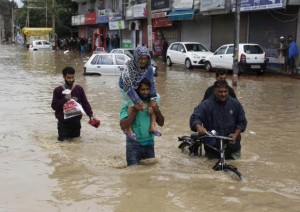
(Reuters) – The prime ministers of India and Pakistan have offered to help each other in efforts to alleviate flood havoc in the disputed Himalayan region of Kashmir, lowering tension between the rival nations after weeks of army clashes and heated rhetoric.
Kashmir is divided by one of the world’s deadliest and most heavily militarized borders. Both the Indian and Pakistani sides have been ravaged by floods that have killed at least 239 people as rivers burst their banks after heavy rain.
The disaster, which left large parts of Srinagar, the capital of Indian-administered Kashmir, deep in water, comes weeks after Prime Minister Narendra Modi canceled high-level peace talks and accused Pakistan of fighting a “proxy war”.
The Hindu nationalist leader’s tone was more conciliatory in a letter to his Pakistani counterpart on Sunday. “It is a matter of great distress that the retreating monsoon rains have played havoc in many parts of our two countries,” Modi wrote to Nawaz Sharif, according to excerpts released by his office. “In this hour of need, I offer any assistance that you may need in the relief efforts that will be undertaken by the government of Pakistan. Our resources are at your disposal.”
Pakistan’s foreign ministry reciprocated, saying the government was “ready to help in whatever way possible to mitigate the suffering of the people affected by the floods” in Indian-controlled Kashmir. It is unlikely either side will accept the other’s offer of help, given the military sensitivities in the region, where hundreds of thousands of troops have faced off for decades. Both prime ministers flew over their respective areas of Kashmir on Sunday to review the extent to the flooding.
At least 175 people have been killed by flash floods and landslides on the Indian side of the de facto border, while Pakistan’s Kashmir State Disaster Management Authority said 64 deaths had so far been reported.
“Most deaths have been caused by houses collapsing, landslides and incidents of drowning,” said Akram Sohail, the head of the organization. “Over 29,406 people have been affected in around 120 villages.”
When he took office in May, Modi invited Sharif to Delhi in an unprecedented gesture that raised hopes of progress to resolve the nuclear armed countries’ differences over Kashmir.
The mainly Muslim region, known for its natural beauty, was divided soon after independence from British rule and partition in 1947 created the separate states of India and Pakistan.
The two nations have fought three wars and came close to a fourth in 2001. Sometimes fatal skirmishes between the two armies are common along the Line of Control, as the de facto border is known. In an apparent bid to thaw ties again, Pakistan last week sent 15 boxes of mangoes to Modi.
“They were delivered to the prime minister’s office on Wednesday last week,” said a spokesman for the Pakistan High Commission in New Delhi. “He must have eaten some of them by now.”







